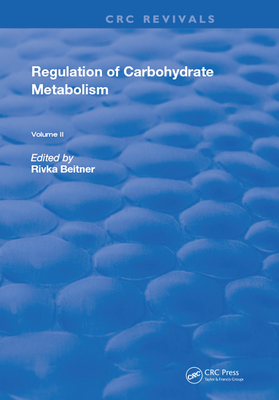Read Online Regulation of Carbohydrate Metabolism: Volume II - Beitner file in PDF
Related searches:
And glucose storage and release (glycogen metabolism) is achieved by hormonal (insulin, glucagon, epinephrine and norepinephrine) regulation (resulting in the covalent modification of essential enzymes -primarily phosphorylation) and by tissue-specific differences in the distribution of key enzymes.
This article explains why some people have a fast metabolism and how you can speed up yours to burn more calories.
Carbohydrate metabolism is essential for cellular energy balance as well as for the biosynthesis of new cellular building blocks. As animal nutrient intake displays temporal fluctuations and each cell type within the animal possesses specific metabolic needs, elaborate regulatory systems are needed to coordinate carbohydrate metabolism in time.
Besides hepatic glucose metabolism, no is also involved in the regulation of lipid metabolism at the level of lipogenesis and lipolysis. Whether no stimulates or inhibits lipid oxidation or synthesis appears to be dependent on the isoforms on nos stimulated, tissue site and the intracellular redox state [141]�.
Live a healthy lifestyle! subscribe to our free newsletters to receive latest health news and alerts to your email inbox.
Modulates the frequency, rate or extent of the chemical reactions and pathways involving carbohydrates.
Aug 1, 2018 this text comprises of two volumes discussing the regulation of carbohydrate metabolism.
Find examples of carbohydrates, learn what carbohydrates are, and find out how they are used by organisms. Alle12 / getty images most of the organic molecules you encounter are carbohydrates.
Since carbohydrate utilization promotes human survival, genes and traits regulating carbohydrate metabolism during exercise and energy storage have been selected throughout evolution. 2 however, current lifestyles are predominantly sedentary, which coupled with the intake of excessive amounts of carbohydrates, has led to metabolic diseases such.
Specifically, we will study the means by which glucose, free fatty acids (ffas), and o2 availability affect hepatic and muscle carbohydrate metabolism.
Carbohydrate metabolism is the whole of the biochemical processes responsible for the metabolic formation, breakdown, and interconversion of carbohydrates in living organisms. Carbohydrates are central to many essential metabolic pathways.
Carbohydrate metabolism is the whole of the biochemical processes responsible for the metabolic formation, breakdown, and interconversion of carbohydrates in living organisms. Carbohydrates are central to many essential metabolic pathways. Plants synthesize carbohydrates from carbon dioxide and water through photosynthesis, allowing them to store energy absorbed from the sunlight internally. When animals and fungi consume plants, they use cellular respiration to break down these stored carbohydr.
In regulation of carbohydrate metabolism include atp, nadh, glucose-6-phosphate, citrate, and fructose-2,6-bisphosphate. Many cell types respond to hormonal and neuronal signals that allow the coordination of metabolism at the level of the entire organism.
Advertisement is it simple or complex?how do you know if a food contains simple or complex.
Consequently, glycolytic transcriptional regulation is important for the metabolic flexibility of pathogens in their attempts to colonize diverse niches. We investigated the transcriptional control of carbohydrate metabolism in the human fungal pathogen candida albicans and identified two factors, tye7p and gal4p, as key regulators of glycolysis.
Many of us are searching for ways to boost our metabolisms, help maintain healthy weights or increase our energy levels. We might think about exercising more, building more muscle and developing healthier eating habits.
Regulation of muscle carbohydrate metabolism during exercise.
The balance between insulin and glucagon, ensures blood glucose homeostasis by regulating.
Oct 12, 2019 the lecture will cover glucose uptake, regulation, output, oxidization, and lactate metabolism.
Since carbohydrate utilization promotes human survival, genes and traits regulating carbohydrate metabolism during exercise and energy storage have been selected throughout evolution. 2 however, current lifestyles are predominantly sedentary, which coupled with the intake of excessive amounts of carbohydrates, has led to metabolic diseases such as type 2 diabetes.
Instead, recent research suggests that carnitine is also crucial in the regulation of carbohydrate metabolism in addition to its role in the oxidation of fatty acids. In isolated rat hearts, administration of carnitine increases the oxidation of glucose while decreasing the oxidation of palmitate.
At its most simplistic level regulation of metabolic pathways inside of the body it's really just a fancy word for a balancing act that's occurring in the body so to illustrate this i have a seesaw and we've been learning about two metabolic pathways glycolysis which is the process of breaking down glucose into pyruvate and gluconeogenesis which is essentially the opposite in which we start.
In the twenty-five years since the discovery of insulin, countless studies have been reported indicating one or another gross alteration in the metabolic proces.
Oct 21, 2020 request pdf exercise and regulation of carbohydrate metabolism carbohydrates are the preferred substrate for contracting skeletal.


Post Your Comments: